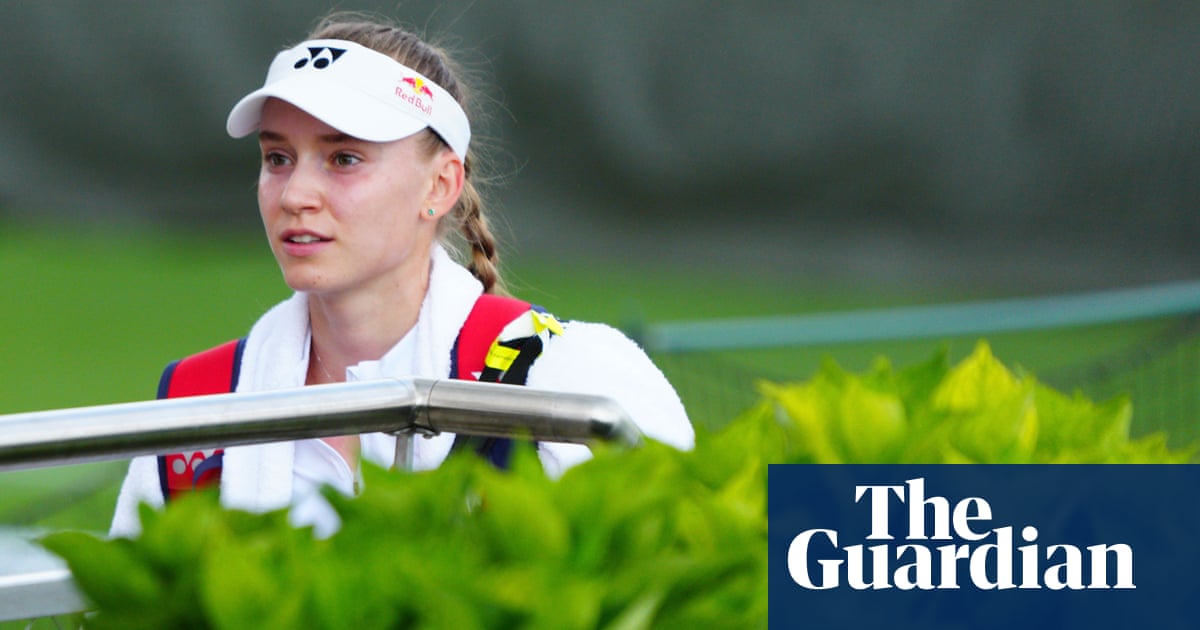
s the final days of high school beckoned for Elena Rybakina five years ago, she found herself at a crossroads in her life. Rybakina had enjoyed a strong junior career that saw her reach No 3 in the world, but she still had to decide whether to throw herself into the meat grinder of professional tennis or take up one of the countless scholarship offers she received from universities across the United States.
Despite her junior pedigree, Rybakina had received no financial support from her home country – Russia – and her parents did not have the funds to finance the prohibitively expensive lifestyle of an aspiring professional tennis player. Her elders were naturally more set on the least risky option.
Jodie Burrage celebrates her first-round victory at Wimbledon
Jodie Burrage breaks new Wimbledon ground with win as Broady advances
Read more
“My parents, of course, like every other parent, were worried if I’m gonna make it [as a professional] – then you never know if [an] injury comes,” she says. “And they wanted for me to have a good school.”
Around the same time that those deliberations were taking place, Rybakina received an offer from the Kazakhstan Tennis Federation (KTF) with funding, training bases, support and money offered in return for representing the country and federation. As they deliberated, Rybakina and her parents were eventually flown to the country, where they met with the president of the federation, Bulat Utemuratov. The agreement they reached would prove a decisive moment on her path towards becoming a Wimbledon champion.
“I think everything came together in that moment,” says Rybakina. “The Kazakhstan Federation, they were looking for players, and I was looking for some help. So we found each other in the perfect moment and this is how I started [my] professional career, I would say.”
Over the past 16 years, numerous tennis players have walked a similar path to Rybakina. The KTF has made it a policy to attract foreign-born players, mostly from neighbouring Russia, to represent the Central Asian country in exchange for financial support and financial safety.
It is a strategy that was formed in 2007, a time when the KTF fell to a nadir. With the organisation on the verge of bankruptcy, the government brought the nation’s top businessmen and sports executives of the country together. It was decided that Utemuratov, a 65-year-old billionaire and formerly a close advisor to the president, would head the federation.
Utemuratov describes his first years as akin to a fast-moving startup. As they took on the challenge of making tennis universally loved in such a vast country where cities stand far apart, they tried to recruit officials and coaches while building infrastructure and attracting sponsors all at once.
“We had to start from scratch. The office of the federation was closed, there were no people working at the time,” says Utemuratov. As the federation put its plans into effect, the need to create a spark of public interest is what led them to seek foreign-born players, offering them not only money but significant support to their careers.
Some of the first players who chose to represent Kazakhstan included Yaroslava Shvedova, a three-time grand slam quarter-finalist and doubles champion, as well as Andrey Golubev and Mikhail Kukushkin. Like Rybakina, Kazakhstan’s offer came at a time when Kukushkin most needed it.
In his youth, Kukushkin’s family could not afford for him to travel abroad, so he did not compete on the ITF junior tour. There were times at home in Volgograd, Russia when, with no courts available during winter, he would train in the multi-sport hall of a prison. When he finally competed on the professional tour aged 17, Kukushkin travelled to his first tournaments with just $100 in his pocket.
“If I didn’t win, I knew I would have to go home and that would be the end,” he says. Despite no funding or coach, Kukushkin reached the top 200 before he hit a ceiling. After being invited to Kazakhstan in the summer of 2008 and meeting with Utemuratov, he opted to switch allegiance.
“It was not just a one-year deal. For him, it was a long term project,” says Kukushkin. “So he really convinced me that he’s very serious about tennis in Kazakhstan. He really wants to help. Not just myself, they want to develop tennis to bring a lot of kids on the tennis court because at that time, tennis was not popular at all in Kazakhstan.”
Elena Rybakina poses with the trophy after winning the Wimbledon women’s singles final against Ons Jabeur.
Elena Rybakina defeated Ons Jabeur to win the Wimbledon title last year. Photograph: Toby Melville/Reuters
Over the past 16 years, the federation’s transformation has been dramatic. According to the KTF, Utemuratov has invested more than $100m into the development of professional tennis in Kazakhstan. There are now 38 regional tennis centres across the country and 364 courts. More than 30,000 take part in the federation’s sessions and court time is subsidised, with court hire rates at its centres dropping from an average of $50 an hour to $10.
“When I come back home to Kazakhstan, I can see that all tennis courts are fully booked. Sometimes it’s even tough for me to get a court because [of] a lot of kids playing tennis, a lot of amateurs playing tennis,” says Kukushkin.
Now that the federation has created interest in tennis, a vast competitive pool of young players and many facilities, their strategy of attracting foreign talent is no more. The focus has now shifted towards giving Kazakhstani players opportunities to thrive on the big stages. Still, the bar set by Rybakina, Kazakhstan’s first grand slam champion, is stratospheric.
“Our best sports person was [Gennady] Golovkin, the boxer, but now everybody talks only about Elena Rybakina,” says Utemuratov. “She’s the new icon and this is a different situation. We’re happy that she encourages a new generation of kids to come and play tennis.”












